Reviews
Topio stin omichli
Theodoros Angelopoulos
Greece, 1988
Credits
Review by Jordan Holtane
Posted on 09 November 2012
Source Instant Netflix
Related articles
Reviews
Landscape in the Mist by Ian
Categories Taking Time: The Cinema of Theodoros Angelopoulos
Jean-Luc Godard famously said of Robert Bresson’s Au hasard Balthazar that it was “the world in an hour and a half”; the same could be said of Angelopoulos’ Landscape in the Mist, a film that is both sprawling and microscopic in its view of mankind’s struggles. In 1980s Greece, a pair of young siblings runs away from their mother, wandering through the country in hopes of finding their long-lost father in Germany. Angelopoulos uses their story as a point of reference for exploring the infinitesimal mechanism of human drama. They glide through a world teeming with emotions, passions, and instincts, one that is non-specific and desolate. Chance encounters and incidents both stirring and heartbreaking drive them with no more or less force than that of their initial objective. Once their search begins, Angelopoulos makes it clear that it’s merely one struggle among countless others, and yet it has all the importance in the world.
“Are you afraid?” is the question that opens the film, Voula asks her younger brother, Alexandros. “No, I’m not,” he replies, as they stand facing the train station, at first unable to take the first step across the platform and into the world beyond. The siblings live with their mother, who remains unseen, a nonentity throughout the film, and decide to leave the dreary pallor of their everyday lives (which is also curiously devoid of other children) in favor of the swirling world outside, to search for the father they’ve never known—another nonentity. Angelopoulos reveals early on in their trip, however, that there is no father; there never was. This revelation is the key to the film’s exploratory and contemplative hypnotism; we view their journey not as a narrative, but rather an eyepiece into mankind’s search for some meaning in the world. We are freed, forced not to wonder about the father, the endpoint, but to consider their wandering itself, taking in each event for what it is and it means. In this sense, being aware of the futility of their journey’s narrative is liberating, and allows for the film’s focus to be at once epic and critical; everyone has something that they strive toward, just like the children want to find their father, and Landscape in the Mist figures this into its scope.
The siblings, shortly after running away, meet a young man, Orestis, from a traveling acting troupe. He is trying to find some work for the group, impelled by his own struggles, and yet some quantum force between him and the siblings brings them together. Orestis readily assumes a quasi-fatherly role to the siblings, and perhaps this is why they are so drawn to him. He shepherds them, brings them to the beach with the rest of his troupe. At one point, he jokes with them about a picture on a strip of film he finds on the street: “Can’t you see? Behind the mist—far away. Can’t you see a tree?” Alexandros looks hard, but sees nothing. “Me neither,” confesses Orestis; their relationship is ultimately unfulfilling. The siblings want to stay with Orestis because he exhibits some of what they’re looking for - safety, caring, guidance - but they are still drawn to the idealized image of their father. They are not the solutions to each other’s problems, merely one distraction out of infinite possibilities. Angelopoulos’ perspective maintains this sense of physics between characters, like flittering particles under a microscope. They are all driven by a kind of electromagnetic force, repelling and attracting each other, each tiny interaction part of an ever-greater whole.
From the outset, Voula and Alexandros’ story is framed within the context of all other stories going on in the world. They’re wandering through dramas while in their own. Angelopoulos actualizes this thematic point by saturating the film in tangential stories and intersecting trajectories. In one scene, the siblings stand over a dying horse as a wedding party spills out of the building behind them. While mourning the animal, Voula quiet while Alexandros stands sobbing, the party cheers, dancing and clapping and whooping, celebrating. In scenes like this lies Angelopoulos’ mastery of dynamics. The siblings’ story is not necessarily special, we just happen to be following them. But in its context, their journey is immense and urgent. However, for someone else, like that giddy wedding party, it’s merely in the background.
Angelopoulos constructs compositions that are vast, taking in all components - a living, breathing world set in motion - and then often zooms into something specific. However, the director’s hand never interferes; long takes and unbroken interactions help tell the siblings’ story and communicate the stories of others. At one point, Voula is raped by a truck driver, and the action is out of view. It is devastating, cold, but such is the world, Angelopoulos seems to say. He suggests the withdrawal of an indifferent God, the deist belief of God as a clockmaker, who set the world in motion and then abandoned it. Throughout their journey, Greece is deserted and desolate, making the world look like an empty fairground. This is also illustrated in the film’s thematic climax: Voula, Alexandros, and Orestis watch silently as a giant stone hand is lifted out of the sea by a helicopter—the hand of God, perhaps, unmoving, severed, and cold. After it flies out of sight, Orestis recites a passage from Rilke: “If I shouted, who would hear me among the choirs of angels?”
Ultimately, Voula and Alexandros’ search leads them across the border into Germany. Once ashore, the new daylight illuminates a heavy fog. The siblings stand together as it begins to dissipate, revealing a giant tree in the distance; Orestis’ photograph materializes in front of them. They walk toward it, and embrace. We know that it signals a change for the children—a new thread among the great tangle of mankind. Angelopoulos does not suggest a meaning for this image, maintaining the focus of the film on a single struggle in an infinite system of drama. From above, the human condition is white noise, but magnified, each individual conflict is monumental.
More Taking Time: The Cinema of Theodoros Angelopoulos
-
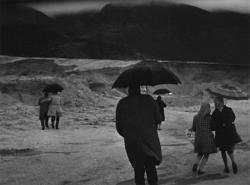
Reconstruction
1970 -
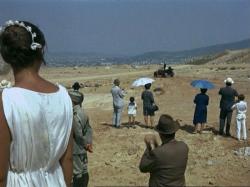
Days of ‘36
1972 -
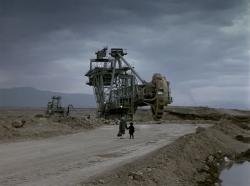
Landscape in the Mist
1988 -
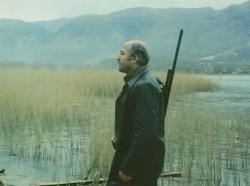
The Hunters
1977 -
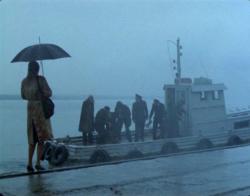
Voyage to Cythera
1983
We don’t do comments anymore, but you may contact us here or find us on Twitter or Facebook.



